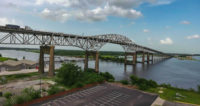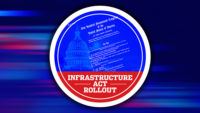Biden Highlights Deficient Calcasieu River Bridge in Infrastructure Pitch

As state transportation officials inch further along with plans to replace the structurally deficient I-10 bridge over the Calcasieu River in Lake Charles, La., President Joe Biden during his May 6 visit to Louisiana highlighted the bridge as an example of a project his $2.3 trillion infrastructure plan could help fund.
Biden’s plan proposes $115 billion above existing surface transportation programs to upgrade bridges, highways and roads in Louisiana. One of the plan’s objectives is to fix 10 of the nation’s most “economically significant bridges” that require replacement, and the plan would have states compete for grant funding. “This bridge could be one of them,” Biden said, speaking with the bridge as a visual backdrop.
The I-10 bridge is one of the state’s most heavily traveled, with more than 80,000 cars and trucks crossing it daily. But it was designed to handle a daily traffic load of 37,000 crossings when it was built in 1952 and lacks modern safety features. At nearly 70 years old, the bridge is two decades past its intended 50-year life span, and the American Road & Transportation Builders Association has classified the bridge as functionally obsolete and structurally deficient.
“It shouldn’t be this hard or take so long to fix a bridge that’s this important,” Biden said. Former President Donald Trump had promised to replace the bridge if he won the 2020 election.
Biden called the bridge a “recipe for disaster,” given that six lanes of interstate narrow into four lanes on the bridge.
After years of slow progress, the state in recent months has made headway with plans and funding for a new bridge. In April, the state approved $30 million toward the new bridge from $216 million it received from the 2020 Coronavirus Response and Relief Supplemental Appropriations Act. And in August 2019, Gov. John Bel Edwards committed $85 million in state funding to match federal funding for the bridge.
The state has also been taking steps toward completing an environmental impact statement, which will evaluate three construction alternatives for the bridge. On March 26, the Louisiana Dept. of Transportation and Development held a public hearing to gain insights on proposed plans for the bridge and closed out a public comment period on April 5. A final public hearing is slated to take place in the fall, and the environmental impact statement could be ready by late 2021.
State officials need to complete the environmental impact statement so it can qualify for federal funding to replace the estimated $850 million bridge. To pay for the bridge, state officials are considering using a combination of state and federal funding and a public-private-partnership (P3) that would be funded by bridge tolls.
Low marks on infrastructure
Lake Charles was the first of two stops for Biden in Louisiana, who also toured the New Orleans Sewerage & Water Board’s Carrollton Plant during his Louisiana visit. The plant, which has been plagued by water main breaks and equipment failures, houses the New Orleans Sewerage and Water Board’s water purification systems. Biden’s plan calls for a $111 billion investment to modernize aging drinking water, storm water and waste water systems.
An injection of federal infrastructure funding would be significant for Louisiana, which received a D+ grade on its most recent Infrastructure Report Card in 2017 from the American Society of Civil Engineers.
Specifically, the plan would invest billions of dollars in roads and bridges, which received a D and D+, respectively for the state, in 2017. That kind of investment could ultimately raise the state’s overall grade in future years, says Norma Jean Mattei, who served as 2017 president of the ASCE and will serve on a committee to work on the state’s 2021 report card.
“Dedicated funds to roads, bridges and drinking water infrastructure will definitely move the needle once Louisiana gets the portion coming to the state,” says Mattei, who is also professor of civil and environmental engineering at the University of New Orleans.
“I don’t think many people realize how much our economy depends on critical infrastructure,” Mattei says. “So having healthy infrastructure that gets good grades can really have a big impact on the nation economically.”


